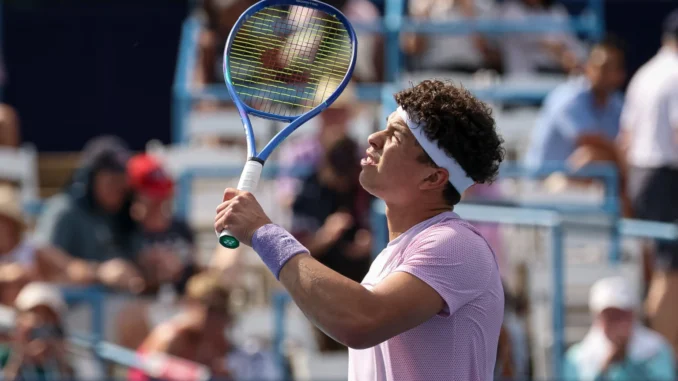
In the twilight of a dramatic Wimbledon second-round match on July 3, 2025, American tennis star Ben Shelton found himself caught in a tense standoff, not just with his opponent but with the chair umpire’s questionable decision-making. Facing Australian Rinky Hijikata on Court 12, Shelton was on the cusp of victory, leading 6-2, 7-5, 5-4, when fading light and slippery conditions prompted both players to request a suspension. Despite their pleas, umpire Nacho Forcadell pressed them to continue, a call that left Shelton fuming. “I was a little bit annoyed,” Shelton admitted post-match, his frustration evident as he recounted the moment he felt ignored by the official, nearly escalating into a confrontation that required supervisor Ali Nili’s intervention.
The match, a gritty battle between the 22-year-old No. 10 seed and the resilient Hijikata, was already a test of endurance. Shelton’s powerful serve and aggressive baseline play had given him a commanding two-set lead, but as the London evening darkened, conditions deteriorated. By 9 p.m., visibility was poor, and the grass court grew slick, posing safety risks. Both players, aware of the dangers, urged Forcadell to halt play. “We both said to the umpire, you know, I don’t think we’re going to finish this set,” Hijikata recalled, echoing Shelton’s concerns. Yet, the umpire insisted they continue, citing a five-minute window before the Hawk-Eye system would shut down. “I think it’s slippery, and Ben agreed,” Hijikata noted, highlighting the shared belief that the court was unsafe.
Shelton’s frustration peaked when play was finally suspended at 9:29 p.m., just as he was set to serve for the match at 5-4, 15-0, after missing three match points on Hijikata’s serve. The timing felt arbitrary, and Shelton, visibly upset, approached the umpire’s chair with purpose, only to be intercepted by Nili. “I guess when he saw a guy my size walking quickly towards the umpire, maybe he thought I was ready to throw hands or something,” Shelton quipped later, his humor masking the intensity of the moment. He clarified that his intent was to voice his concerns, not to escalate tensions. “I was upset in the moment. I wanted to get my point across,” he said, emphasizing his commitment to respectful dialogue despite the heat of the situation.
The next day, Shelton returned to Court 12 and dispatched Hijikata in just 55 seconds, firing three aces to seal a 6-2, 7-5, 6-4 victory. The swift conclusion prompted a lighthearted apology to the crowd for the lack of action. “I’m sorry that you guys didn’t really get to see much tennis,” Shelton said, flashing a smile as he and Hijikata shared a moment of camaraderie at the net. The quick finish, however, didn’t erase the previous night’s tension. Shelton later met with Forcadell in the gym, where they discussed the incident. “I just wanted to give them my thoughts about the situation. They gave me theirs,” he explained, noting that the exchange diffused any lingering animosity. “It probably looked more tense than it was.”
The incident sparked broader discussions about Wimbledon’s handling of late matches. Commentators Andrew Castle and John Lloyd sided with Shelton, arguing that umpires must enforce stricter guidelines to prevent unsafe conditions. “The chair umpire really needs to be on that,” Lloyd remarked, stressing the importance of clear rules. The episode also recalled similar frustrations from other players, like Nicolas Jarry, who had raised concerns about slow serving earlier in the tournament. For Shelton, the ordeal underscored his growing presence as a vocal leader, unafraid to challenge decisions while maintaining sportsmanship.
Shelton’s run at Wimbledon, his third appearance at the Championships, showcased his meteoric rise. The former University of Florida star, who reached the 2023 US Open semifinals, advanced to face Marton Fucsovics in the third round, carrying a 29-13 record for 2025. His ability to move past the umpire dispute and focus on his game highlighted his maturity, even as he acknowledged the need to apologize to Forcadell. “I guess maybe I should apologize to Nacho if he felt scared,” Shelton said with a chuckle, diffusing the narrative of conflict with his trademark charisma. As he navigates the pressures of Wimbledon and beyond, Shelton’s blend of fiery competitiveness and cool-headed reflection marks him as a force in tennis, ready to take on any challenge—umpires included.
Leave a Reply